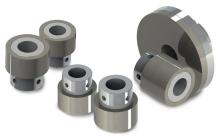Motor Drive Shaft Couplings
High performance shaft couplings are used to join two shafts to transmit power and rotational motion and may be designed to permit some degree of parallel, axial, or angular misalignment. Typically, shaft couplings do not allow for shaft disconnection during operation; however, specific models with torque limiting capabilities permit slipping or automatic disconnection when a specified torque limit is reached; these devices are also known as “torque limiters.”
Selecting and installing the suitable shaft coupler for the application can provide significant savings through improved performance and reduced downtime and maintenance requirements.

High Performance Shaft Coupling Product Options
Miki Pulley’s shaft coupling lineup encompasses solutions for various machine applications. Our couplings are engineered for superior performance, using finite element analysis (FEA) paired with decades of power transmission experience. All couplings are rigorously tested for quality, durability, and longevity.
We leverage worldwide production and engineering assets to stay abreast of emerging industrial technology and requirements. Our shaft couplings are available in a variety of styles and configurations to provide high precision and operational efficiency.
Miki Pulley's Motor Shaft Couplings
Metal Disc Shaft Couplings
Miki Pulley’s metal disc shaft couplings feature flexible disc elements that provide superior torsional rigidity while allowing varying degrees of shaft misalignment. Using finite element analysis throughout research and development, we have engineered stainless steel elements with optimal size and shape. With ultralow inertia, outstanding reliability, and zero backlash performance, our metal disc couplings are ideal for use in the following applications:- Machine tools
- Semiconductor manufacturing equipment
- Ball screw actuators
- Packaging equipment
Jaw & Spider Shaft Couplings
Our general-purpose ALS STARFLEX jaw and spider shaft couplings use a simple design to transmit rotational power. With a “curved jaw” profile, ALS couplings position a polyurethane elastomer element (the “spider”) between two sintered aluminum hubs.The three-component assembly press fits together with a jaw from each hub precisely fitted with the lobes of the spider. In operation, the jaw coupling torque is transmitted through the elastomer lobes. The curved profile of the hubs and elements provides uniform compression with zero backlash on starts and stops.
In addition to providing excellent vibration and shock absorption, these couplings can transmit more than double the torque of “standard” jaw couplings. We offer jaw spider shaft couplings with the following two hub types with three-element hardness options that ensure optimum performance for your transmission torque, response, and misalignment requirements:
- Key/set screw
- Clamp
Bellow Shaft Couplings
Miki Pulley’s BELLOWFLEX bellows shaft couplings feature polyester resin boots that provide high elasticity for high damping performance and extremely small counterforce from mounting misalignment. Our bellows couplings combine an aluminum alloy hub with the plastic boot for zero backlash performance. They are compact, lightweight, and specially designed for easy installation and removal in tight spaces. Applications include:- Stepper motors
- Encoders
Slit Style Couplings
The ASK Slit Style Coupling is called a “sliced” coupling. This coupling is an ideal solution to compensate for inevitable shaft misalignments while offering high torque and torsional stiffness for demanding applications.The unique slotted structure features machined intermittent slits, making for a one-piece design that offers high performance, the ability to handle shaft misalignments, and low cost. With multiple materials available (stainless steel, aluminum & polymer), the ASK is one of our most versatile couplings.
Pin & Hub Shaft Couplings
Engineered to reduce reaction force caused by mounting misalignment, our PARAFLEX pin and hub shaft couplings use a lightweight, high-strength aluminum alloy as their primary hub material. Their unique design also produces a damping effect from sliding at the friction surface between the pin and dry metal.Our pin and hub couplings allow for exceptional angular misalignment and keep backlash to a minimum. Standard clamp hubs make mounting fast and easy.
Rigid Shaft Couplings
Our SERVORIGID rigid shaft couplings provide ultra-high torsional stiffness. Unlike flexible couplings, these rigid couplings have no elements to absorb differences between the centers of two shafts, which gives them high torsional stiffness.Optimum shape and hardness were calculated via finite element analysis and 3D-CAD and CAE modeling to provide superior performance in demanding applications. And, because the outer diameter relative to torque can be reduced compared to flexible couplings, smaller units can be used, which helps reduce the moment of inertia. Applications include:
- Servo motors
- Stepper motor
Spring & Coil Couplings
Miki Pulley’s BAUMANNFLEX spring and coil shaft couplings are designed to connect hubs that mount on shafts to other hubs, with a metal coil spring separating the hubs. They provide excellent flexibility and high torque characteristics in a compact package. The unique design and outstanding performance of our spring and coil couplings make them ideal for the following applications:- Vacuum equipment
- Medical equipment
- Printing machinery
Magnetic Couplings
Miki Pulley’s magnetic couplings are a non-contact type that utilizes attraction and repulsion of the magnetic poles. Input and output have no contact, while rotational power is transmitted by magnetism alone. This allows for zero wear and dust generation, no noise, no vibration, and no thermal conduction. Misalignment tolerance is significant, and attachment/detachment can be quickly done. Versatile configurations include, but are not limited to:- Butt shaft connections
- Parallel axis angles
- Varying engagement angles
Get in Touch with Miki Pulley for Precision Engineered High Torque Shaft Couplings Today
In the market for a high torque electric motor shaft coupling? Look no further than Miki Pulley for your aluminum shaft coupler needs. Contact us for more information on high torque electric motor shaft couplings or request a quote for specific pricing information today.
















